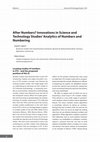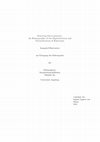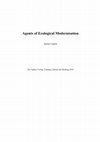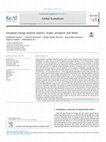Edited volumes by Ingmar Lippert

Science & Technology Studies, 2021
Methods have been recognised in STS as mattering for a long time. STS ethnographies establish a b... more Methods have been recognised in STS as mattering for a long time. STS ethnographies establish a boundary object with which STS scholars weave a pattern: From such ethnographic accounts we learn that knowledge is produced locally. Ethnography has over the recent decades been highlighted as a key method in STS. And that STS ethnography is specifically shaped by being often configured to consider its forms of collaboration or intervention in the field. This special issue focuses on how methods matter, specifically on how STS ethnographic collaboration and its data are translated into ethnographic writing, or performative of other reality effects. Exploring STS’s own methods-in-action brings to attention the messy landscape of method practice. Our objective in this exploration is to develop a genre of writing about method that fosters response-ability and enables the audience of research output to position themselves between the research materials and practices that were invested into the study. This special issue hopes to contribute to STS engagement with its methods by way of methodography. Methodography serves as a genre of analytic writing, that articulates specificity and scrutinises the situated practices of producing STS knowledge.

editorial, 2018
Locating studies of numbers in STS-and the proposed position of this SI Number studies have featu... more Locating studies of numbers in STS-and the proposed position of this SI Number studies have featured often in past STS scholarship. Indeed, one might articulate a history of STS analytic concepts and theories by tracking number studies. One might begin such an undertaking by pointing out that studies in STS followed anthropology in proposing numbers as social entities, noting that in anthropology number studies have featured since the end of the nineteenth century. When STS studies generally were focussing on epistemology, the analytic framings of number scholarship in STS reflected that. From the 1970s until the end of the century number studies proliferated. In line with other areas of STS, a focus on ontology began to appear in number studies in the mid 1990s, albeit at first hesitantly (Watson, 1990; Watson-Verran, 1995). But it was not the STS past with its range of number studies that interested us when we set out to assemble this special issue of Science & Technology Studies. We were more interested to show how contemporary number studies were deploying new analytics that are emerging in STS. To this end we were concerned to have contributors reflect on the analytic framing they were using to make their STS number study and to comparatively articulate the analytic affordances it offered. In beginning we register our delighted surprise at how this special issue turned out, noting how much we learned along the way from the authors who have contributed. We offer six papers each of which we see as broaching a novel issue in STS number studies. They attend to a very wide range of sociotech-nical situations where numbers and/or algorithms feature. The nexus numbers and/as algorithms is puzzlingly relevant to taking on numbers. Recognising that numbers both are and are not algorithms (and vice versa) we begin by making clear how we see relations between numbers and algorithms. While algorithms mobilise a protocol that elaborates how to work relations between numbers, e.g. embedded in a database, numbers express a protocol that lays out how to work relations embedded within a number as it comes into being in the banal routines of enumeration, as for example in Watson (1990). Seeing things Science & Technology Studies 31(4) Editorial

Geoforum, 2015
We propose an analysis of environmental management (EM) as work and as practical activity. This a... more We propose an analysis of environmental management (EM) as work and as practical activity. This approach enables empirical studies of the diverse ways in which professionals, scientists, NGO staffers, and activists achieve the partial manageability of specific “environments”. In this introduction, we sketch the debates in Human Geography, Management Studies, Science and Technology Studies to which this special issue contributes. We identify the limits of understanding EM though the framework of ecological modernization, and show how political ecology and work-place studies provide important departures towards a more critical approach. Developing these further, into a cosmopolitical direction, we propose studying EM as sets of socially and materially situated practices. This enables a shift away from established approaches which treat EM either as a toolbox whose efficiency has to be assessed, or as simply the implementation of dominant projects and the materialisation of hegemonic discourse. Such a shift renders EM as always messy practices of engagement, critique and improvisation. We conclude that studying the distributed and situated managing agencies, actors and their practices allows to imagine new forms of critical interventions.

Book Part III investigates some of the limits and contradictions of management of the environment... more Book Part III investigates some of the limits and contradictions of management of the environment and its resources, through detailed discussions of key dimensions of applied environmental management. This part introduces studies of 1) resource management (rivers as well as recycling), 2) specific techniques drawn on in corporate and public environmental management (suggestion schemes, and respectively, visualisation techniques), and finally, 3) policy discourses (Clean Development Mechanism). The studies presented here are linked by a common thread which recognises that the historicity of environmental management as a social practice requires us to scrutinise its specificity as a practical, social, cultural as well as political achievement. The ascension of science and modernity gave rise to a qualitative change in cultural conceptualisations of the human-nature relationship: nature became an object to be ‘managed’ by so-called experts. By now, however, environmental management has come under critique in that what it proposes as solutions may simultaneously comprise the causes of environmental problems. First, the means used by environmental management can be identified as instances of modernism, industrialism as well as capitalism. Second, scholars of environmental problems criticise the ‘instruments’ of environmental ‘management’ for reproducing the problems, rather than solving them. To examine how environmental problems ought to be approached a critical stance is now seen as essential. Necessarily then, do issues of ideology, epistemology and theory crop up.
Books by Ingmar Lippert

Enacting Environments is an ethnography of the midst of the encounter between corporations, susta... more Enacting Environments is an ethnography of the midst of the encounter between corporations, sustainable development and climate change. At this intersection 'environmental management' and 'carbon accounting' are put into practice. Purportedly, these practices green capitalism. Drawing on fieldwork of day-to-day practices of corporate environmental accountants and managers, Ingmar Lippert reconstructs their work as achieving to produce a reality of environment that is simultaneously stable and flexible enough for a particular corporate project: to stage the company, and in consequence capitalism, as in control over its relations to an antecedent environment. Not confined to mere texts or meetings between shiny stakeholders co-governing the corporation – among them some of the world's biggest auditing firms, an environmental non-governmental organisation (NGO) and standards – control is found to be distributed across as well as limited to a myriad of practical work situations, involving spreadsheets and slide shows. Carbon accounting takes place in the midst of docile as well as dissident humans and nonhumans. As a result of this analysis, Enacting Environments establishes how carbon emission facts are produced and co-configure climate change realities. Ingmar Lippert argues: within capitalism, environment does not exist in the singular but in the plural; and these environments are not existing out there to be read off some anterior Nature but they are brought into social, economic and political existence in the practices of accounting for them. Providing a portfolio of methods to study techno-managerial engagement with carbon, Ingmar Lippert shows how much is overlooked in received theories of corporate environmental accounting, theories of the performativity of environmental economics and, ultimately, the epistemic and ontic effects of fact-making in the heart of neoliberal capitalism.
cite as: Ingmar Lippert (2013). Enacting Environments: An Ethnography of the Digitalisation and Naturalisation of Emissions. PhD Dissertation in Sociology, University of Augsburg, Augsburg.

This book addresses both, Science and Technology Studies and Environmental Sociology, problematis... more This book addresses both, Science and Technology Studies and Environmental Sociology, problematising the role of the human, breathing, agent who is required to put Ecological Modernisation into practice. This type of agent has been undertheorised by Ecological Modernisation Theory. Ingmar Lippert offers a conceptualisation of such an agent by drawing on relationalist takes on structure and agency, i.e. actor-network theory and Pierre Bourdieu's school of thought. For Ecological Modernisation Theory remaining hegemonic, as his book suggests in its first part, it is apt to focus on the agency and constraints in the ``doing'' environmental management. By way of a case study in the construction of a glass recycling network in part two, Ingmar Lippert tells a critical story exploring a Bourdieusian conceptualisation of field and habitus applied on the agent of ecological modernisation in their hybridity.

This book contributes to an emerging position in the debate on how environmental management can f... more This book contributes to an emerging position in the debate on how environmental management can fruitfully be researched. To this end, it employs two texts conceptualising and contextualising environmental management as an object of study. First, by means of a philosophy of science case study on an university course on environmental management, the book problematises the discourse of sustainable development and the hegemonic take on managing environments. Critiquing the shortcomings of the course ``Environmental and Resource Management'' of Brandenburg University of Technology we offer a conceptualisation of a new academic field, Environmental Management Studies. Such a field would objectify the social realities of environmental management as a practical activity taking place within a messy world. Grounding this field, the book suggests, calls for engaging critically with three broad issues: the history of environmental management, the hegemonic discourse on sustainability and possibilities for radical reforms. Second, by way of historically contextualising environmental management rationalities, the book discusses how radical political theory and policy-making could draw insights from that history. Informed by Richard Grove's account of the relation between imperialism and the emergence of modern ways of controlling natures (1994) the book provides a more reflexive base for Environmental Management Studies in manoeuvres towards the shared goal of a green future for all.
The contributions collected in this special issue of ephemera question the underlying ideologies ... more The contributions collected in this special issue of ephemera question the underlying ideologies and assumptions of carbon markets, and bring to light many of the contradictions and antagonisms that are currently at the heart of ‘climate capitalism’. They offer a critical assessment of the political economy of carbon trading, and a detailed understanding of how these newly created markets are designed, how they (don’t) work, the various actors that are involved, and how these actors function together to create and contest the ‘atmosphere business’. In 5 notes, 6 articles, 1 interview and 3 book reviews, some of the most prominent critical voices in debates about the atmosphere business are brought together in this special issue.
Book Chapters by Ingmar Lippert
Wie forschen mit den "Science and Technology Studies"?, 2020
Abstract
How do we narrate about how we ‘use’ STS for social scientific research? How do we stud... more Abstract
How do we narrate about how we ‘use’ STS for social scientific research? How do we study STS research practices? Do all research practices that involve STS concepts contribute to STS? This text constitutes the afterword to an edited volume that contributes to providing answers in the borderlands of these questions. The afterword problematises how we perform reflexivity, how we are (not) analysing STS's own research practices, and how we tell simultaneous stories of what STS as a field is or might be. With this problematisation, this essay argues for a praxeography of STS, involving methodographic, conceptographic and cartographic analyses.

Attempting to tackle climate change with market solutions hinges on the existence of emissions. W... more Attempting to tackle climate change with market solutions hinges on the existence of emissions. We know much about the politics of undoing emissions—via offsets (e.g., Böhm and Dabhi 2009). But where do emissions come from? How are they done? Carbon footprinting seems to be the simple answer. Is this merely a technical matter? In this chapter I explore how emissions come into being; carbon accounting emerges as techno-political practice, fraught with non-transparency.
This chapter argues that successful corporate carbon accounting practices efficiently and skillfully ignore significant political implications of the company’s practical relation to climate change. ‘Successful’ in this case signifies what matters for the company to compete well in capitalist markets. By examining voluntary carbon accounting at a financial services corporation, I invite an engagement with how the technicality and politics of carbon interrelate in accounting. I ground my analysis in ethnographic fieldwork across 20 months in the corporate social responsibility (CSR) unit at one of the 50 largest global companies. Over this period, I supported the CSR unit’s management of their sustainability data, in exchange for overt and explicit research access to the CSR unit’s activities.

Yearbook 2012 of the Institute for Advanced Studies on Science, Technology and Society
In a recent instantiation by Bruno Latour of how STS can engage with matters of concern, he conce... more In a recent instantiation by Bruno Latour of how STS can engage with matters of concern, he conceptualises a changing relationship of humans with earth. For Latour, the scientists’ notion ‘anthropocene’ illustrates how humans accept that their industrial activities are not merely causing some surface environmental problems but that they establish a geological force. His proposal is that each of us must struggle inwardly to achieve a proper engagement with Gaia (Lovelock). Questioning this individualist take, this paper reviews STS studies on how humans and societies enact the imagery of ‘being able to manage’ environments. We find conflict. I argue that studying the practices of so-called environmental management shows that through this activity environments are not merely known, but also enacted. This move implies that competing enactments of the subjection of environments to management are possible. Consequently, the performative capacities of environmental management emerge as a fundamentally politically and ethically relevant object of study.
cite as: Lippert, Ingmar (2014). ‘Latour’s Gaia — Not down to Earth?: Social Studies of Environmental Management for Grounded Understandings of the Politics of Human-Nature Relationships’. In Bammé A, Getzinger G, Berger T, ed., Yearbook 2012 of the Institute for Advanced Studies on Science, Technology and Society. München, Wien: Profil, p. 91–111.
ems-research.org, 2010
In the 1970s widespread awareness of a ‘global environmental crisis’ began to emerge in Western s... more In the 1970s widespread awareness of a ‘global environmental crisis’ began to emerge in Western societies. Specific staff were employed to deal with environmental problems. While they are supposed to manage the greening of their organisations, committed to sustainable development, research did not study these agents in their own right. By drawing on two ethnographic cases this paper questions whether their dispositions are likely to help in approaching sustainability. The paper then takes up Bourdieu’s concepts of habitus and field, a critical realist account of normativity and ANT’s emphasis of heterogeneity to argue that the agents have conflicting normative dispositions.
Implementing Environmental and Resource …, Jan 1, 2011
Implementing Environmental and Resource …, Jan 1, 2011
Umweltmanagement an Hochschulen: Nachhaltigkeitsperspektiven, Vol. 18., 2005
Papers by Ingmar Lippert

Verran, Helen, 2020
Helen Verran is a postcolonial historian and philosopher of science at Charles Darwin University ... more Helen Verran is a postcolonial historian and philosopher of science at Charles Darwin University in Australia. Her contributions, addressing concepts’ performances and effects, are groundbreaking in the study of generalising logics, difference, and ontological politics. This analysis of how concepts get enacted responds to key challenges of social sciences and humanities inquiry.
Verran’s ‘relational empiricism’ analyses the many and various practices of conceptualising and their effects. Making relations is a central practice in conceptualising and, thus, part of her analysis. Her approach is relational in that the concepts she analyses are understood as doing something: They relate and separate entities. It is empirical as Verran analyses embodied experiences of worlds/worldings. Central in relational empiricism is the inquiry into tensions and overlaps between concepts as doing differences. Verran is best known for her ethnographic work, particularly on the concept of ‘number’ (Lippert & Verran, 2018; Verran, 2001).
For Verran, concepts are not merely an intellectual category. Rather, concepts are also embodied and lived, collectively shared and performed in ‘repeated routine performances’ (Verran, 2001, p. 157). In Verran’s material-semiotic analysis, concepts have a realness and are performed or reperformed in situations. This renders concepts as particular in time and place.
A world shaped by particular and situated concepts, then, is a world of differences. These differences are not threatening but workable, albeit amid generative dissensus. This take allows possibilities for creating ‘futures that are different from the past’ (Verran, 2001, p. 35). Verran has developed analytical tools for recognising and doing difference together, for ongoing relating and going-on with others.
Before this entry presents three Verranian tools, it locates Verran’s work and influences. Then, it introduces and illustrates Verran’s key method—storytelling—and presents central tools. The final section addresses politics in Verran’s work.

Global Transitions, 2020
Energy poverty, a condition whereby people cannot secure adequate home energy services, is gainin... more Energy poverty, a condition whereby people cannot secure adequate home energy services, is gaining prominence in public discourse and on political and policy agendas. As its measurement is oper-ationalised, metrical developments are being socially shaped. A European Union mandate for biennial reporting on energy poverty presents an opportunity to institutionalise new metrics and thus privilege certain measurements as standards. While combining indicators at multiple scales is desirable to measure multi-dimensional aspects, it entails challenges such as database availability, coverage and limited disaggregated resolution. This article converges scholarship on metrics e which problematises the act of measurement e and on energy poverty e which apprehends socio-political and techno-economic particulars. Scholarship on metrics suggests that any basket of indicators risks silencing significant but hard to measure aspects, or unwarrantedly privileging others. State-of-the-art energy poverty scholarship calls for indicators that represent contextualised energy use issues, including energy access and quality, expenditure in relation to income, built environment related aspects and thermal comfort levels, while retaining simplicity and comparability for policy traction. We frame energy poverty metrology as the socially shaped measurement of a varied, multi-dimensional phenomenon within historically bureaucratic and publicly distant energy sectors, and assess the risks and opportunities that must be negotiated. To generate actionable knowledge, we propose an analytical framework with five dimensions of energy poverty metrology, and illustrate it using multi-scalar cases from three European countries. Dimensions include historical trajectories, data flattening, contextualised identification, new representation and policy uptake. We argue that the measurement of energy poverty must be informed by the politics of data and scale in order to institutionalise emerging metrics, while safeguarding against their co-optation for purposes other than the deep and rapid alleviation of energy poverty. This 'dimensioned' understanding of metrology can provide leverage to push for decisive action to address the structural underpinnings of domestic energy deprivation.

Science & Technology Studies, 2018
Calculating and making public carbon footprints is becoming self-evident for multinational corpor... more Calculating and making public carbon footprints is becoming self-evident for multinational corporations. Drawing on ethnographic data I narrate of the calculative routine practices involved in that process. The narration shows how routine yet sophisticated mathematical transformations are involved in retrieving salient information, and second that mathematical consistency is readily interrupted by 'dirty data'. Such interruptions call for opportunistic data management in devising work-arounds, which effect enough mathematical coherence for the number to hold together. Foregrounding an episode of calculative data retrieval, interruption and work-around contrivance, I employ it to make a comparative reading of two STS analytics, arguing: whereas Callon and Law's (2005) analytic technique of qualculation reveals the episode of data management and work around contrivance as a teleologically oriented process that manages to bridge mathematical inconsistency, Verran's technique of ontologising troubles enables us to recognise how a number-as-network configures its particular kind of certainty and coherence, how it sticks.
Dominant politics desires evidence-based environmental decision-making, employing facts. Grounded... more Dominant politics desires evidence-based environmental decision-making, employing facts. Grounded in an ethnography of the production of corporate carbon footprints, environmental facts are analysed as the effect of work and data processing. In the practical reality of work, environment exists in a hybrid and tactical dataspace. Implications for environmental politics question premises of both, ecological modernisation and state control of the environment.

Corporate carbon footprint data has become ubiquitous. This data is also highly promissory. But a... more Corporate carbon footprint data has become ubiquitous. This data is also highly promissory. But as this paper argues, such data fails both consumers and citizens. The governance of climate change seemingly requires a strong foundation of data on emission sources. Economists approach climate change as a market failure, where the optimisation of the atmosphere is to be evidence based and data driven. Citizens or consumers, state or private agents of control, all require deep access to information to judge emission realities. Whether we are interested in state-led or in neoliberal 'solutions' for either democratic participatory decision-making or for preventing market failure, companies' emissions need to be known. This paper draws on 20 months of ethnographic fieldwork in a Fortune 50 company's environmental accounting unit to show how carbon reporting interferes with information symmetry requirements, which further troubles possibilities for contesting data. A material-semiotic analysis of the data practices and infrastructures employed in the context of corporate emissions disclosure details the situated political economies of data labour along the data processing chain. The explicit consideration of how information asymmetries are socially and computationally shaped, how contexts are shifted and how data is systematically straightened out informs a reflexive engagement with Big Data. The paper argues that attempts to automatise environmental accounting's veracity management by means of computing metadata or to ensure that data quality meets requirements through third-party control are not satisfactory. The crossover of Big Data with corporate environmental governance does not promise to trouble the political economy that hitherto sustained unsustainability.











Uploads
Edited volumes by Ingmar Lippert
Books by Ingmar Lippert
cite as: Ingmar Lippert (2013). Enacting Environments: An Ethnography of the Digitalisation and Naturalisation of Emissions. PhD Dissertation in Sociology, University of Augsburg, Augsburg.
Book Chapters by Ingmar Lippert
How do we narrate about how we ‘use’ STS for social scientific research? How do we study STS research practices? Do all research practices that involve STS concepts contribute to STS? This text constitutes the afterword to an edited volume that contributes to providing answers in the borderlands of these questions. The afterword problematises how we perform reflexivity, how we are (not) analysing STS's own research practices, and how we tell simultaneous stories of what STS as a field is or might be. With this problematisation, this essay argues for a praxeography of STS, involving methodographic, conceptographic and cartographic analyses.
This chapter argues that successful corporate carbon accounting practices efficiently and skillfully ignore significant political implications of the company’s practical relation to climate change. ‘Successful’ in this case signifies what matters for the company to compete well in capitalist markets. By examining voluntary carbon accounting at a financial services corporation, I invite an engagement with how the technicality and politics of carbon interrelate in accounting. I ground my analysis in ethnographic fieldwork across 20 months in the corporate social responsibility (CSR) unit at one of the 50 largest global companies. Over this period, I supported the CSR unit’s management of their sustainability data, in exchange for overt and explicit research access to the CSR unit’s activities.
cite as: Lippert, Ingmar (2014). ‘Latour’s Gaia — Not down to Earth?: Social Studies of Environmental Management for Grounded Understandings of the Politics of Human-Nature Relationships’. In Bammé A, Getzinger G, Berger T, ed., Yearbook 2012 of the Institute for Advanced Studies on Science, Technology and Society. München, Wien: Profil, p. 91–111.
Papers by Ingmar Lippert
Verran’s ‘relational empiricism’ analyses the many and various practices of conceptualising and their effects. Making relations is a central practice in conceptualising and, thus, part of her analysis. Her approach is relational in that the concepts she analyses are understood as doing something: They relate and separate entities. It is empirical as Verran analyses embodied experiences of worlds/worldings. Central in relational empiricism is the inquiry into tensions and overlaps between concepts as doing differences. Verran is best known for her ethnographic work, particularly on the concept of ‘number’ (Lippert & Verran, 2018; Verran, 2001).
For Verran, concepts are not merely an intellectual category. Rather, concepts are also embodied and lived, collectively shared and performed in ‘repeated routine performances’ (Verran, 2001, p. 157). In Verran’s material-semiotic analysis, concepts have a realness and are performed or reperformed in situations. This renders concepts as particular in time and place.
A world shaped by particular and situated concepts, then, is a world of differences. These differences are not threatening but workable, albeit amid generative dissensus. This take allows possibilities for creating ‘futures that are different from the past’ (Verran, 2001, p. 35). Verran has developed analytical tools for recognising and doing difference together, for ongoing relating and going-on with others.
Before this entry presents three Verranian tools, it locates Verran’s work and influences. Then, it introduces and illustrates Verran’s key method—storytelling—and presents central tools. The final section addresses politics in Verran’s work.
cite as: Ingmar Lippert (2013). Enacting Environments: An Ethnography of the Digitalisation and Naturalisation of Emissions. PhD Dissertation in Sociology, University of Augsburg, Augsburg.
How do we narrate about how we ‘use’ STS for social scientific research? How do we study STS research practices? Do all research practices that involve STS concepts contribute to STS? This text constitutes the afterword to an edited volume that contributes to providing answers in the borderlands of these questions. The afterword problematises how we perform reflexivity, how we are (not) analysing STS's own research practices, and how we tell simultaneous stories of what STS as a field is or might be. With this problematisation, this essay argues for a praxeography of STS, involving methodographic, conceptographic and cartographic analyses.
This chapter argues that successful corporate carbon accounting practices efficiently and skillfully ignore significant political implications of the company’s practical relation to climate change. ‘Successful’ in this case signifies what matters for the company to compete well in capitalist markets. By examining voluntary carbon accounting at a financial services corporation, I invite an engagement with how the technicality and politics of carbon interrelate in accounting. I ground my analysis in ethnographic fieldwork across 20 months in the corporate social responsibility (CSR) unit at one of the 50 largest global companies. Over this period, I supported the CSR unit’s management of their sustainability data, in exchange for overt and explicit research access to the CSR unit’s activities.
cite as: Lippert, Ingmar (2014). ‘Latour’s Gaia — Not down to Earth?: Social Studies of Environmental Management for Grounded Understandings of the Politics of Human-Nature Relationships’. In Bammé A, Getzinger G, Berger T, ed., Yearbook 2012 of the Institute for Advanced Studies on Science, Technology and Society. München, Wien: Profil, p. 91–111.
Verran’s ‘relational empiricism’ analyses the many and various practices of conceptualising and their effects. Making relations is a central practice in conceptualising and, thus, part of her analysis. Her approach is relational in that the concepts she analyses are understood as doing something: They relate and separate entities. It is empirical as Verran analyses embodied experiences of worlds/worldings. Central in relational empiricism is the inquiry into tensions and overlaps between concepts as doing differences. Verran is best known for her ethnographic work, particularly on the concept of ‘number’ (Lippert & Verran, 2018; Verran, 2001).
For Verran, concepts are not merely an intellectual category. Rather, concepts are also embodied and lived, collectively shared and performed in ‘repeated routine performances’ (Verran, 2001, p. 157). In Verran’s material-semiotic analysis, concepts have a realness and are performed or reperformed in situations. This renders concepts as particular in time and place.
A world shaped by particular and situated concepts, then, is a world of differences. These differences are not threatening but workable, albeit amid generative dissensus. This take allows possibilities for creating ‘futures that are different from the past’ (Verran, 2001, p. 35). Verran has developed analytical tools for recognising and doing difference together, for ongoing relating and going-on with others.
Before this entry presents three Verranian tools, it locates Verran’s work and influences. Then, it introduces and illustrates Verran’s key method—storytelling—and presents central tools. The final section addresses politics in Verran’s work.
Based on an ethnographic study of corporate agents of ecological modernisation over a period of 13 months, this paper provides an exploration of three cases of enacting classification. Drawing on Actor-Network theory, we problematise the silencing of a range of possible modalities of consumption facts and point to the ontological ethics involved in such performances. In a context of global warming and corporations construing themselves as able and suitable to manage their emissions, and, additionally, given that the construction of carbon emissions has performative con-sequences, the underlying practices need to be declassified, i.e. opened for public scrutiny. Hence the paper concludes by arguing for a collective engagement with the ontological politics of carbon.
cite as
Ingmar Lippert. 2014. ‘Studying Reconfigurations of Discourse: Tracing the Stability and Materiality of “Sustainability/Carbon”’. Journal for Discourse Studies — Zeitschrift für Diskursforschung 2 (1): 32–54.
Grounded in ethnographic fieldwork at a leading multinational in the financial services sector over a period of more than 12 months, I focus on everyday work practices as taking place in a capitalist context. It is through practical work that the presences of carbon emissions are imagined and brought into being. Thus, carbon emerges as co-constituted by thought. I will focus on instances in which the corporate machinery, i.e. automated thought, had to be supplemented by immediate human practices of 1) thinking themselves, 2) organising materials to think through and 3) ordering others to think. At another layer of analysis, I am to scrutinise carbon construction practices through the tension between creatively thinking / envisioning – and calculating / number crunching. Tracing members' practices allows to reconstruct how their usage of dichotomies renders carbon emissions intelligible.
As a result of this analysis carbon accounting emerges as enabled through an extended system of cognition. The paper concludes by tentatively suggesting a view on this machinery as co-constituting a wider – to borrow Guattari's term – Universe: A Universe of references to carbon.
Following these relations of thinking allows to question the conceptualisations of the actors involved and how their practical interactions render carbon, nature and our society (un)sustainable. This, I hope, provides a chance to better conceptualise individuals, their social and material contexts, and through that, corresponding room for manoevre.
a) a programmatic essay, "Latour's Gaia – Not down to Earth?: Social Studies of Environmental Management for Grounded Understandings of the Politics of Human-Nature Relationships" https://www.academia.edu/8963310/ and
b) a special issue on "Environmental Management as Situated Practice" http://doi.org/7sd or https://www.academia.edu/15472228/
Updates at https://gitlab.com/ilippert/standard-essay/-/blob/master/standard.pdf